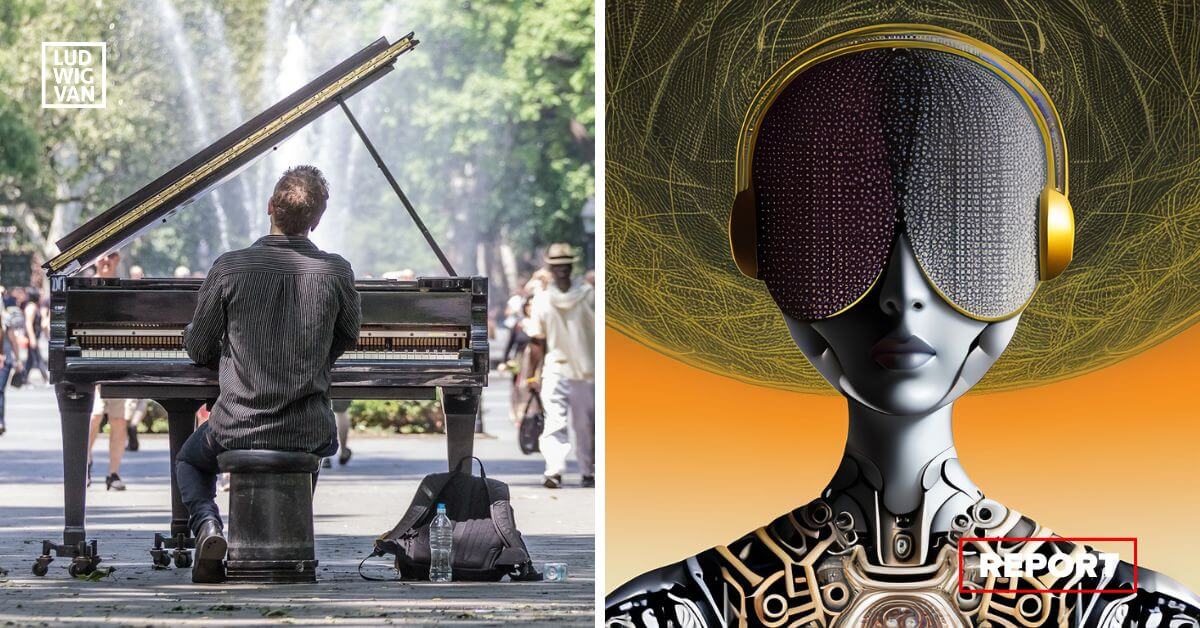
Universal Music Group (UMG), one of the industry’s giants, is challenging the right of streaming platforms to play AI-based works that essentially riff off their vast catalogue of copyrighted material.
UMG sent letters to Spotify, Apple Music, and other streaming platforms asking them to block AI platforms from sifting through their copyrighted material in order to train itself to compose. Universal represents internationally recognized pop stars like The Weeknd, Nicki Minaj and Ariana Grande, and it looks like they have reason to be concerned.
“UMG’s success has been, in part, due to embracing new technology and putting it to work for our artists — as we have been doing with our own innovation around AI for some time already,” UMG said in a statement on April 17. “However, the training of generative AI using our artists’ music … begs the question as to which side of history all stakeholders in the music ecosystem want to be on.”
Industry insiders wonder about the effectiveness of such a move, given that there are a number of other ways that AI could source original material.
AI & Music Generation
What’s the problem? When an artificial intelligence interface creates music, it does so based on prompts that it has been given. It then samples from the existing body of recorded music to generate something that resembles and falls within those parameters.
AI needs source material to work from. But, who’s compensating the original creators? And, who owns the “new” music? A newly released single brought the issue to a head.
A new song called Heart on My Sleeve was released on TikTok, Spotify, YouTube, and other streaming platforms with vocals said to be Drake and The Weeknd on April 15. The song was officially credited to “Ghostwriter” — perhaps referencing the rumours that Drake’s songs are written by a ghostwriter. Fans loved it, and it was quickly racking up impressive streaming numbers.
Problem is, neither Drake nor The Weeknd had anything to do with it. The song was generated by AI, clearly using existing recorded material by both artists.
UMG demanded that the song be removed, and as of April 18, the track can no longer be found online. It’s a situation that has made the rest of the industry sit up and take notice.
The Law
What exactly does the law say? Not unexpectedly, neither Canadian nor U.S. copyright law addresses the issue of AI-generated art specifically. The U.S. Copyright Office has launched an initiative to look into the issues raised.
In a guidance paper issued by the U.S. Copyright Office in March 2023, they offer interim advice.
“In the Office’s view, it is well-established that copyright can protect only material that is the product of human creativity. Most fundamentally, the term “author,” which is used in both the Constitution and the Copyright Act, excludes non-humans.”
“If a work’s traditional elements of authorship were produced by a machine, the work lacks human authorship and the Office will not register it. For example, when an AI technology receives solely a prompt 27 from a human and produces complex written, visual, or musical works in response, the “traditional elements of authorship” are determined and executed by the technology — not the human user.”
If the work is actually generated by AI, it becomes a grey area.
“In the case of works containing AI-generated material, the Office will consider whether the AI contributions are the result of ‘mechanical reproduction’ or instead of an author’s ‘own original mental conception, to which [the author] gave visible form,’” the new guidance says.
Canadian copyright laws are in a similar situation. Essentially, the Canadian Copyright Act protects those works it defines as “original”. That stems from a Supreme Court of Canada (SCC) decision back in 1957.
The decision of the case Kilvington Bros. Ltd. v. Herbert Goldberg et al defines copyrighted works as “original expression of thought of its originator, that originated from him and that he did not copy”.
That part seems to leave the door open to an interpretation that says a work created by AI is original, in that it does not directly copy the original.
Most Canadian legal experts, including the Canadian Bar Association, point to another SCC decision of 2004, the case CCH Canada Ltd. v. Law Society of Upper Canada. The high court’s decision defines the term “original work” within the sphere of copyright as something that required “an exercise of skill and judgment”. Chief Justice Beverley McLachlin further specifies that the effort “must not be so trivial that it could be characterized as a purely mechanical exercise.”
That definition seems to incorporate the notion of AI-generated images and music, which come from AI sampling and a few prompts by a human user. An “intellectual effort” is required.
Most of those issues, however, have yet to be tested in court. OpenAI, an American AI research lab, runs a hugely popular platform called DALL·E 2 which can generate images and what it calls art works based on a user’s description. Like many other AI platforms, OpenAI claims that it owns what it calls the original images users create from the material it has in turn sampled from other sources, although it allows subscribers to use them, even to sell them. Their assertion of ownership has not yet been tested in court.
It’s a brave new world.
#LUDWIGVAN
Get the daily arts news straight to your inbox.
Sign up for the Ludwig van Daily — classical music and opera in five minutes or less HERE.
- PREVIEW | SUMMER OPERA LYRIC THEATRE Presents Handel’s Xerxes, Mozart’s Idomeneo & Puccini’a La Boheme July 26 To August 4 - July 26, 2024
- PREVIEW | YENSA Festival V.2 Offers Black Flames Performances & Other Ways To Celebrate Black Women In Dance - July 25, 2024
- PREVIEW | Canadian Talent Conspicuous In The Met: Live In HD 2024-25 Season - July 25, 2024



